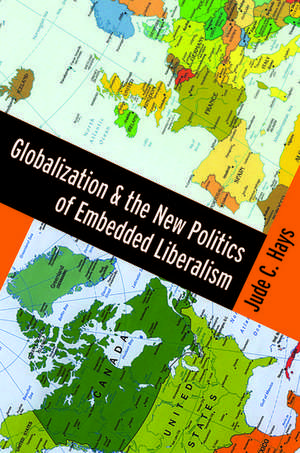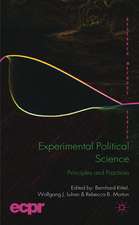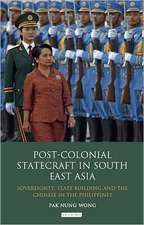Globalization and the New Politics of Embedded Liberalism
Autor Jude Haysen Limba Engleză Paperback – 10 sep 2009
| Toate formatele și edițiile | Preț | Express |
|---|---|---|
| Paperback (1) | 197.77 lei 31-37 zile | |
| Oxford University Press – 10 sep 2009 | 197.77 lei 31-37 zile | |
| Hardback (1) | 267.71 lei 31-37 zile | |
| Oxford University Press – 5 noi 2009 | 267.71 lei 31-37 zile |
Preț: 197.77 lei
Preț vechi: 229.61 lei
-14% Nou
Puncte Express: 297
Preț estimativ în valută:
37.85€ • 41.10$ • 31.79£
37.85€ • 41.10$ • 31.79£
Carte tipărită la comandă
Livrare economică 11-17 aprilie
Preluare comenzi: 021 569.72.76
Specificații
ISBN-13: 9780195369328
ISBN-10: 0195369327
Pagini: 208
Ilustrații: 50 figures and tables
Dimensiuni: 155 x 231 x 15 mm
Greutate: 0.34 kg
Editura: Oxford University Press
Colecția OUP USA
Locul publicării:New York, United States
ISBN-10: 0195369327
Pagini: 208
Ilustrații: 50 figures and tables
Dimensiuni: 155 x 231 x 15 mm
Greutate: 0.34 kg
Editura: Oxford University Press
Colecția OUP USA
Locul publicării:New York, United States
Recenzii
The theoretical presentation is clear, and the empirical evidence presented is quite convincing. The book makes important points about the tensions in today's integrated economies, as well as how they may play out politically. Hays's explicit and careful attention to the logical consistency of his arguments, and his focus on very specific economic and political relationships, make his work particularly trenchant.
Hays demonstrates persuasively why the two main champions of economic globalization--the United States and United Kingdom--are also the most vulnerable among the industrialized democracies to significant backlash against it: their institutional inability and ideological unwillingness to provide adequate social protection against globalization's most disruptive impacts on workers and communities. This is an extremely timely and important book to which scholars and policymakers alike should pay close attention.
This is a brilliant book that forcefully advances the argument that in countries with decentralized labor markets and majoritarian political institutions, globalization raises the demands of citizens for protection from the vagaries of the global economy but also limits the capacity of countries to provide that protection. The book beautifully presents a diverse array of convincing empirical evidence with innumerable insights on how globalization is changing our world and our politics.
Academic and scholarly presses alike have published scores of books praising the benefits of globalization. This, as Jude Hays demonstrates in his prescient book, may be wishful thinking. Combining fresh theoretical insights with sophisticated empirical methods, Hays shows how globalization may be vulnerable to shifting popular sentiments. This would have made for important reading prior to the economic crisis that began in 2007; it is urgent reading today.
Hays demonstrates persuasively why the two main champions of economic globalization--the United States and United Kingdom--are also the most vulnerable among the industrialized democracies to significant backlash against it: their institutional inability and ideological unwillingness to provide adequate social protection against globalization's most disruptive impacts on workers and communities. This is an extremely timely and important book to which scholars and policymakers alike should pay close attention.
This is a brilliant book that forcefully advances the argument that in countries with decentralized labor markets and majoritarian political institutions, globalization raises the demands of citizens for protection from the vagaries of the global economy but also limits the capacity of countries to provide that protection. The book beautifully presents a diverse array of convincing empirical evidence with innumerable insights on how globalization is changing our world and our politics.
Academic and scholarly presses alike have published scores of books praising the benefits of globalization. This, as Jude Hays demonstrates in his prescient book, may be wishful thinking. Combining fresh theoretical insights with sophisticated empirical methods, Hays shows how globalization may be vulnerable to shifting popular sentiments. This would have made for important reading prior to the economic crisis that began in 2007; it is urgent reading today.
Notă biografică
Jude C. Hays is an Assistant Professor of Political Science at the University of Illinois. His research has been supported by the National Science Foundation, and he has published articles in journals such as Comparative Political Studies, Political Analysis, European Union Politics, International Organization, World Politics, International Studies Quarterly, the American Journal of Political Science, and the Journal of Economic Behavior and Organization.
















